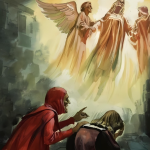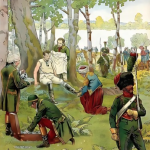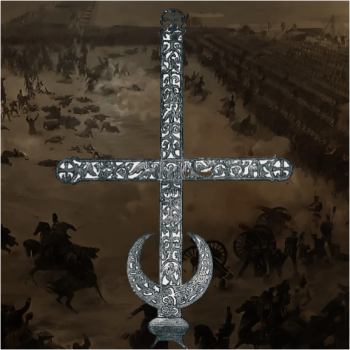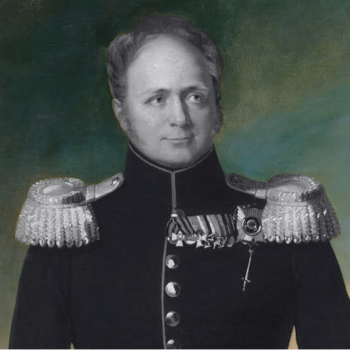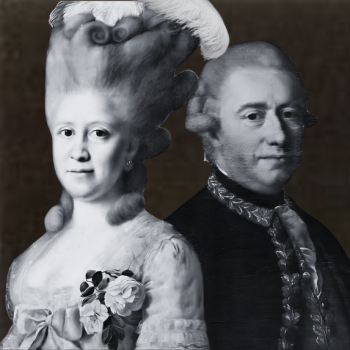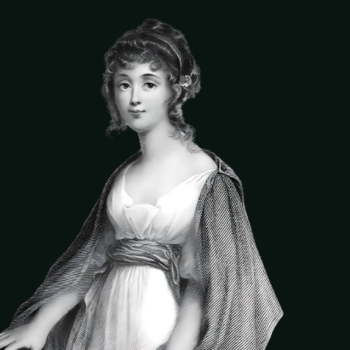A Tournament Of Shadows:
XVI. “Ideologists Destroy All Illusions”
Two or three days elapsed before the Emperor and the Tsar saw each other (except at parade, at dinner time, the play, etc.) Every evening Talleyrand went to the abode of the Princess of Tours, where Alexander Pavlovich was also a regular guest. The Tsar seemed preoccupied, so Talleyrand did his best to make the conversation as light as possible. One day, however, as he was looking over Mithridate (which had just been given to him,) Talleyrand remarked on the number of passages in the piece that might serve as allusions. Addressing himself to the Princess of Tour, he quoted several verses, but his little plan did not succeed. The Tsar said he had a headache and withdrew. Talleyrand, who saw de Caulaincourt every morning, solicited impressions.
“Do you not think that the Emperor Alexander is growing cooler?” asked Talleyrand.
“No,” de Caulaincourt replied. “I think he is only perplexed. His enthusiasm for Napoleon is still the same, his perplexity would soon cease.”
Every morning after his breakfast, Napoleon continued to see the Germans whom he prized (and whose suffrage he wished to gain.)The errand he had given to the author of Faust was faithfully executed, and Wieland soon arrived with Goethe to lunch with the French Emperor. Napoleon was fond of discussing elevated subjects, which were generally unknown to military men but, being anxious to shine in conversation, he always carefully prepared some subject which he broached unexpectedly to the individual with whom he was speaking. At Berlin, the previous year, addressing himself to the Swiss historian Johannes von Müller, Napoleon had tried to fix the different epochs of the great efforts of the human mind. The astonishment on Müller’s face was evident when he heard Napoleon assert a declaration which he must have known by heart. “The propagation and the rapid development of Christianity had worked an admirable reaction of the spirit of Greece against that of Rome, and lay stress on or applaud the skill which Greece, vanquished by physical force, displayed in dealing with the conquest of the empire of intellect,” a conquest, he added, “which had been effected by taking advantage of the beneficial seeds of Christianity, whose influence on mankind had been so great.”
“Monsieur Wieland,” said Napoleon, “we like your works much in France. It is you who are the author of Agathon and Oberon. We call you the Voltaire of Germany.”
“Sire, the comparison would be a flattering one, if it were justified. It is very great praise from very kind people.”
“Tell me, Monsieur Wieland, why your Diogenes, your Agathon, and your Peregrinus are written in the equivocal style which mixes romance with history and history with romance. A superior man like yourself ought to keep each style distinctly separate. What is mixed is generally confused. That is the reason we like the drama so little in France. But I am afraid to say too much on this subject, because I am dealing with someone so much more conversant with the matter than I am; especially as what I say has as much reference to Monsieur Goethe as to you.”
“Sire, your Majesty will permit us to point out to you that, in the French theatre, there are very few tragedies which are not a mixture of history and romance; but I am now on Herr Goethe’s land. He will reply himself, and certainly he will reply well. As to myself, I wished to give man some useful lesson. The authority of history was necessary. I intended that the examples I borrowed should be easy and agreeable to imitate, and to do that, it was necessary to mix the ideal and the romantic. Men’s ideas, sometimes, are worth more than their actions, and good novels are more valuable than mankind. Compare, sire, the century of Louis XIV with Télémaque, where are found the best lessons for sovereigns and for the people. My Diogenes is virtuous, though living in a cask.”
“But do you know what happens to those who always display virtue in their stories,” said Napoleon. “They cause the impression that virtue is but a dream. History has often been calumniated by historians themselves.”
This conversation was interrupted by de Nansouty, who told Napoleon that a messenger from Paris had brought him some letters. Dalberg (the Prince Primate) left with Wieland and Goethe and begged Talleyrand to accompany them to the dinner at his house that evening.
All the great minds of Weimar and its environs attended this dinner. Talleyrand observed a lady from Eisenach called Baroness Bechtolsheim who sat opposite the Prince Primate. No one spoke to her without giving her the name of a muse. The Prince Primate’s manner of addressing her, for example, went like this: “Clio, will you have so and so?” To which Baroness Bechtolsheim would simply reply “Yes” or “No.”
After dinner, everyone went to the play, and, when it was over, Talleyrand saw Napoleon home, going afterward to the Princess of Tour’s. The Tsar was already there, but his face did not wear its ordinary expression, rather it was plain that his uncertainties still existed.
“Has the Emperor been talking to you lately?” asked Alexander Pavlovich.
“No, sire,” said Talleyrand, venturing to add that if he had not seen de Vincent, he could have believed that the Erfurt interview was only a “pleasure party.”
“What does de Vincent say?”
“Sire, only very reasonable things. He hopes that Your Majesty will not allow yourself to be led by the Emperor Napoleon to take threatening, or at least, offensive measures against Austria. If Your Majesty will permit me to tell you so, I have formed the same opinion.”
“I should also like to refrain from them, but it seems very difficult to do so, for the Emperor Napoleon seems to me much incensed.”
“But, Sire, you have certain observations to make. Can Your Majesty not consider as useless those provisions relative to Austria and say that they are included in the treaty of Tilsit? It seems to me that one could add that the proofs of confidence ought to be reciprocal; and that Your Majesty, while allowing the Emperor Napoleon to be, in a measure, the judge of the circumstances where certain articles of the draft submitted to you could be executed, has, on the other hand, the right to exact that he leave you to judge the cases where Austria might become a real obstacle to the projects adopted by the two sovereigns. This being understood between you, everything concerning Austria should be erased from the draft of the treaty. And if Your Majesty thinks of the fright that the Erfurt interview, arranged without the knowledge of the Emperor Francis, must have caused at Vienna, perhaps you would like to reassure him in a letter, on everything which interests him personally.”
Talleyrand saw that Alexander Pavlovich was pleased, as he took notes with his pencil on all that he had said; but still, it was necessary to decide, and he had not yet done that. It was de Caulaincourt who, by his personal influence over the Tsar that carried his determination.
The following day Alexander Pavlovich showed Talleyrand his observations on the project of the treaty, and blandly said to him: “You will recognize yourself there, perhaps, in several places. I have added many things taken from the past conversations the Emperor Napoleon and I have had together.”
Those observations were good enough, and Talleyrand found that the Tsar decided to propose them the next morning. It pleased Talleyrand, for Alexander Pavlovich’s expression was not so free from anxiety that it did not cause him to wish this first step had been taken. Talleyrand’s fears were not without foundation, for at a three-hour conference the Tsar yielded nothing to Napoleon, who sent for Talleyrand at the time of their separating.
“I have done nothing with the Emperor Alexander,” Napoleon said.
“Sire, I believe Your Majesty has done a great deal since he has been here, for the Tsar Alexander is completely under the spell.”
“He is simply acting a part. If he cares so much for me, why does he not sign?”
“Sire, there is something so chivalric in his nature that so many precautions quite shock him. He believes that by his word and his affection for you, he is more bound than by treaties. His letters, which Your Majesty gave me to read, are full of passages which prove it.”
“That is all nonsense!” said Napoleon, walking up and down in his room, interrupting the silence now and then by saying: “I shall not return to that subject again with him—that would show him that I placed too much interest in it. Our only interview, by the mystery in which it was enveloped, will impose on Austria. She will believe in the existence of secret articles, and I shall not undeceive her. If, at least, Russia, by her example, induce the Emperor Francis to recognize Joseph as King of Spain, that would be something, but I don’t expect it. What I have done in eight days with the Tsar Alexander would require years to do at Vienna. I do not understand your leaning towards Austria. It is the ancient policy of France.”
“Sire, I believe that such ought to be the policy of the new France, and if I dared add it, your own, for you, sire, are the one sovereign on whom the world depends most to preserve civilization. The presence of Russia at the peace of Teschen has been a serious misfortune for Europe, and a grave error on the part of France, who did nothing to prevent it.”[1]
“That is no longer the question, my dear. We must take things as they are. You must charge de Vergennes with the responsibility of the past. Few people now take an interest in civilization.”
“We think of our business.”
“You do not understand—you know why it is that no one deals openly with me? It is that having no children, they believe I only have a life interest in France. That is the secret of all that you see here. They are afraid of me, and each one gets out of trouble as well as he can. It is a bad state of things for everybody. It must needs someday be remedied. Continue seeing the Tsar Alexander. I have been perhaps a little brusque in our conferences, but I desire that we part on friendly terms. I have still a few days before me. Tomorrow we shall go to Weimar, and it will not be difficult to be gracious on the grounds of Jena where they are having a fête for me. You will be at Weimar, before myself—tell the duchess who is too grand a lady to come to Jena, that I should like to see all the savants who live in her midst, and that I beg her to acquaint them with my wish. It would be a pity that all the plans for this journey should fail.”
Napoleon had sent all the Comédie-Française to Weimar. The day began with a hunt on the grounds of Jena, and later there was a grand dinner served on a table in the shape of a horseshoe, at which were placed only reigning princes. This was an opportunity for them to render fresh homage to Napoleon by calling on the prince of Neufchâtel and Talleyrand to sit at that table. On leaving the table they went to the play, where Voltaire’s La Mort de César was to be represented before all the sovereigns and princes who went from Erfurt to Weimar. After the play, they passed into the ballroom, a very beautiful hall, lofty and square, adorned with many columns, and illuminated from above. The impression that La Mort de César had left was soon driven away by the appearance of several pretty young ladies, who had come to the ball. Napoleon loved to touch upon serious questions in the drawing room, during the hunt, at a ball, and sometimes even at the gaming table. He wanted to prove that he was not susceptible to the impressions that such displays give to men. Having made his rounds of the room and pausing near some young ladies, he retired at a distance from the vast throng and requested Friedrich Müller (a member of the literary society of Weimar) to fetch Goethe and Wieland. As instructed, Müller went to fetch those gentlemen, who, with some other members of that academy, looked upon the extraordinary sight. On approaching, Goethe asked Napoleon’s permission to introduce his comrades.
“You are pleased with our plays I hope,” said Napoleon to Goethe. “Have these gentlemen come to them?”
“To the one of today, sire, but not to those at Erfurt.”
“I am sorry for it. A good tragedy should be looked upon as the most worthy school for superior men. From a certain point of view, it is above history. In the best history, very little effect is produced. Man when alone is but little affected, men assembled receive the stronger and more lasting impressions. I assure you that Tacitus, the historian, that you are always quoting, never taught me anything. Could you find a greater and, at times, more unjust detractor of the human race? In the most simple actions, he finds criminal motives, he makes emperors out as the most profound villains, in order to awake admiration for the genius that has penetrated them. People are right in saying that his Annals are not a history of the empire, but an abstract of the prison-records of Rome. They are always dealing with accusations, with convicts, and with people who open their veins in their baths. He who speaks incessantly of accusations, he is the most notorious informer. What an involved style! How obscure! I am not a great Latin scholar, but Tacitus’ obscurity displays itself in ten or twelve Italian and French translations that I have read, I, therefore, conclude that his chief quality is obscurity, that it springs from that which one calls his genius, as well as from his style, and that it is so connected with his manner of expressing himself only because it is in his conception. I have heard people praise him for the fear he awakes in tyrants—he makes them afraid of the people. That is a great mistake and does the people harm. Am I not right, Monsieur Wieland? But I am interrupting you. We are not here to speak of Tacitus. Look how well the Tsar Alexander dances!”
“I do not know why we are here, sire,” Wieland replied, “but I know that, at this moment, Your Majesty makes me very happy.”
“Ah! Really? In what way?”
“Sire, the manner in which Your Majesty has spoken to me, makes me forget that he has two thrones. I see in him only a man of letters, and I know that Your Majesty will not disdain that title, for I remember that, on leaving for Egypt he signed his letters, ‘Bonaparte, member de l’institut et général en chef.’ It is, then, to a man of letters, sire, that I shall try to reply. I felt, at Erfurt, that I defended myself but feebly when I was the object of your criticism—but I believe I am able to defend Tacitus better. I understand that his principal aim is to punish tyrants—but if he denounces them it is not to their slaves, whose revolt would only bring a change of tyranny; he denounces them to the justice of ages and to mankind. And the latter ought to have had enough trouble and experience, that its reason should henceforth acquire the rule heretofore solely enjoyed by its passions.”
“That is what all our philosophers say; but that supremacy of reason I look all about for and find it nowhere.”
“Sire, it is not long since Tacitus began to have so many readers. That hankering for him is a clear progress of the human mind, for, for centuries, he was shut out of academies as well as from courts. The slaves of taste were quite as much afraid of it as the servants of despotism. It is only since Racine named him Le plus grand peintre de ‘antiquité, that your universities and our own have thought this judgment might be true. Your Majesty says that in reading Tacitus, you see nothing but assassins, informers, and scoundrels; but, sire, that is exactly what the Roman Empire was, governed by those monsters fallen under Tacitus’ pen. The genius of Tacitus traveled the world with the legions of the Republic. The genius of Tacitus must almost always have been applied to the study of the prison-records of Rome, for there only could he find all the history of the Empire. It is even only in prison-records, that historians can become acquainted with those unhappy times, amongst all nations, when princes and their people, opposed in views and principles, live trembling before each other. Then, the slightest pretext gives rise to criminal trials, and death appears to be inflicted by centurions and executioners oftener than by time and nature. Sire, Suetonius, Dion, and Cassius relate a much greater number of crimes than Tacitus, in a style void of energy, while nothing is more terrible than Tacitus’ pen. However, his genius is as impartial as it is inexorable. Whenever he can see any good, even in the monstrous reign of Tiberius, he looks it out, takes hold of it, and shows it off in the bold relief he gives to everything. He can find even praise for that imbecile Claudius, who was really so only by nature and by his dissipation. That impartiality—the most important quality of justice—Tacitus exercises on the most opposite subjects, on the Republic as well as the Empire; on citizens as well as on princes. By the stamp of his genius, one would believe he could love only the Republic. One could confirm that opinion by his words on Brutus, Cassius, and Codrus, so deeply engraved in the memory of our youth; but when he speaks of the emperors who had so happily reconciled what was thought could not be reconciled, the Empire and liberty, one feels that the art of governing appears to him the most beautiful discovery on earth.”
The prince-primate and all the academy of Weimar which surrounded Wieland, could not contain their joy.
“Sire,” Wieland continued, “if it be true to say of Tacitus, that tyrants are punished when he paints them, it is still more true to say that good princes are rewarded when he traces their images and presents them to future glory.”
“I have too strong a party to cope with, Monsieur Wieland, and you neglect none of your advantages. I think you knew that I did not like Tacitus; do you correspond with Herr von Müller, whom I saw at Berlin.”
“Yes, Sire.”
“Confess that he has written to you on the subject of our conversation.”
“It is true, sire. It is by him that I knew your Majesty liked to speak of Tacitus, but did not, however, like him.”
“I do not like to say I am beaten, Monsieur Wieland. To that I would consent with difficulty. Tomorrow I return to Erfurt, and we shall continue our discussion. I have a good store of weapons in my arsenal for sustaining that Tacitus has not entered far enough into the development of the causes of events; that he has not sufficiently shown the mystery of the actions that he relates, and their mutual linking together in order to prepare the judgment of posterity, which must judge men and governments such as they were in their time and in the midst of the circumstances which surrounded them.” Napoleon concluded the conversation with Wieland with a mild expression. “The pleasure of being with you has caused me to be, for some time, an object of scandal for the dancers.”
After pausing for some moments with the prince-primate to witness the beautiful contre-dance and speaking with the Duchess of Saxe-Weimar about the elegance and beauty of that brilliant fête, Napoleon left the ball and went back to the apartment prepared for him. All the young academicians, fearing to trust to their memory, had already gone away to write down among themselves all that they had heard. The following day Napoleon and his officials left Weimar, and the Kings of Saxony, Württemberg, and Bavaria set off to return to their dominions.
When Napoleon returned to Erfurt, he was on more friendly and confidential terms with Alexander Pavlovich than he had yet been. Napoleon did not seem to take any real interest in anything except in what pleased the Tsar.
“A life of excitement fatigues me,” Napoleon told Alexander Pavlovich. “I need rest, and at present, I long only for the time when I can give myself up to domestic life, to which all me tastes lead. But that happiness is not for me. Is there any home without children, and can I have any? My wife is ten years older than myself—I beg your pardon, this must all appear ridiculous to you, but I obey the dictates of my heart, which it soothes me to unbosom to you.” Napoleon then talked about the long separation, the great distance, and the difficulty in seeing each other again. “But there is only a short time before dinner, and I must again assume all my composure in order to give de Vincent his audience of leave.”
Talleyrand saw Napoleon at a very late hour that evening. The Emperor was very much pleased with the day and asked Talleyrand to stay with him a long time after he had retired. His singular agitation compelled him to ask questions of Talleyrand without waiting for an answer. At last, Napoleon pronounced the one-word divorce. “My destiny exacts it, and the tranquility of France demands it,” said Napoleon. “I have no successor. Joseph is nothing, and he has only daughters.[2] It is I who must found a dynasty. I can only do so by getting married to a princess from one of the reigning houses of Europe. The Emperor Alexander has sisters. There is one whose age suits me. Speak of that to Romanzoff. Tell him that once my affairs in Spain are settled, I will enter into all his views for the partition of Turkey. Besides, other arguments will not fail you, for I know you are an advocate of divorce. The Empress Josephine believes in it also, I can tell you.”
“Sire, if Your Majesty permits I will say nothing to Count Romanzoff, although he be the hero of the Chevaliers du Cygne of Madame de Genlis. I do not think he has sense enough. Besides, after I have told him what you have suggested he will have to repeat it all to the Tsar Alexander. Will he repeat it correctly, or will he choose to repeat it incorrectly? I cannot tell. It is much more natural, and I may say, much more simple, to have a conversation with the Tsar Alexander himself about so important a question; and if Your Majesty adopts this opinion, I shall undertake to prepare the way for him.”
“Well and good but remember that it is not as coming from me you must speak,” said Napoleon. “It is as a Frenchman that you must address him, in order that he may obtain from me a decision ensuring the stability of France whose fate would be uncertain at my death. As a Frenchman, you could say everything you liked. Joseph, Lucien and all my family offer you a free field. Say about them all you like, they are nothing for France. My son even, but that is useless to say, would need to be my son over again, in order to succeed peacefully to the throne of France.”
It was late. Talleyrand, nevertheless, ventured to go to the Princess of Tour (whose door was not yet closed.) The Tsar had remained there longer than usual, and he related (with admirable good faith) to the princess the sad scene of that morning.
“Nobody has a true idea of that man’s character,” said Alexander Pavlovich. “What alarming measures he sometimes resorts to, for other countries, he is by his position forced to take. We do not know how good he is. You think so, do you not, you that know him well?”
“Sire, I have many personal reasons for, and I always state them with great pleasure. Dare I ask Your Majesty if tomorrow morning you can grant me an audience?”
“Tomorrow? Yes, willingly, before or after I have seen de Vincent. I have a letter to write to the Emperor Francis.”
“After, sire, if you permit it. I should be very sorry to retard that good work. The Emperor Francis is in great need of comfort, and I have no doubt that your Majesty’s letter will procure that for him.”
“That is at least my intention.” The Tsar remarked with astonishment that it was nearly two o’clock.
The next day, before going to the appointed audience, de Vincent called on Talleyrand who told him how much reason he had to be satisfied with everyone in general, and with the Tsar in particular. His face beaming with satisfaction, de Vincent bid Talleyrand goodbye, and gave him an affectionate grasp of the hand. Talleyrand then met with the Tsar regarding the preliminary inquiries of marriage between Napoleon and his sister, Maria Pavlovna. At the first word, the Tsar understood him, and he understood him precisely as Talleyrand had wished him to.
“If it were only a question of myself I would willingly give my consent, but my consent is not the only one we must have,” said Alexander Pavlovich. “My mother has retained a power over her daughters, that I must never question. I can try to give her certain advice which it is probable she may follow, but I do not dare to take it upon myself to say she will. All that, inspired by a real friendship, ought to satisfy the Emperor Napoleon. Tell him that I shall be with him in a moment.”
“Sire, Your Majesty will not forget that that conversation ought to be solemn and affectionate. Your Majesty will speak of the interests of Europe and of France. Europe requires that the throne of France be protected from every storm, and it is the manner of reaching that great end which Your Majesty is about to propose.”
“That will be my text. It is a fertile field. I will see you this evening at the Princess of Tour’s.”
Talleyrand informed Napoleon of the result of his interview; he was delighted with the idea that he would have to reply instead of asking. Talleyrand scarcely had time to add several words. Already Tsar Alexander Pavlovich dismounted from his horse in the yard. The two sovereigns, that is, Napoleon and the Tsar, remained for several hours together. From that moment onward, the whole court was struck with the familiar expression of friendship that existed between them. Etiquette seemed relaxed between them during those last days, and it may be said that an air of harmony was felt everywhere. Indeed, the great divorce question was put on hold.
During the final days of their meeting, the Emperors attended together a performance of Voltaire’s Œdipe. Napoleon was already dreaming of founding a lasting empire. The Tsar, believing he had bound Napoleon to himself, was flattered by the thought that through his personal influence, he had won for Russia the support of the man who the rest of the world paid homage. During Act I, in the scene when Philoctetes says: “L’amitié d’un grand homme est un don des dieux,” Alexander Pavlovich arose and took the hand of Napoleon in the presence of all Erfurt.[3] They both looked upon each other as essential to their common future. When the Tsar made his departure from Erfurt, both men separated with testimonies of sincere regrets, and complete confidence.
The final morning that Napoleon spent at Erfurt was employed seeing various people. He was surrounded by princes whose armies he had either destroyed, dominions he reduced, or pride he had humbled. Nobody dared ask for anything. They only wished to be seen and be remembered by him. Such humility was without recompense. Napoleon only noticed the academicians of Weimar, and it was to them alone that he spoke.
“Are there many ‘ideologists’ in Germany?” asked Napoleon.
“Yes, sire,” replied one of them, “a sufficiently large number.”
“I pity you. I have some at Paris. They are dreamers; and dangerous dreamers. They are all plain or disguised materialists.”
The term “ideology,” (and consequently, “ideologists,” or “idealogues,”) was a very new concept at the time. The term made its first appearance during the French Revolution. Antoine Destutt de Tracy, the man who coined the word, was one of the savants whom the Convention entrusted with the management of the newly founded Institut de France in 1795.[4] “Ideology” was a theory that social life approached facts from the point of view of an “ideal,” and interpreted them (consciously or unconsciously,) to both prove the validity of its analysis and justify said ideal. Every ideological construction, therefore, involved the projection of a particular ideal into the past and future, and as an evaluation of the present. Ideologies contained programs for the future improvement of society (along with quasi-scientific explanations of social facts,) interpreted in such a way that the desired future state is overtly (or covertly) scheduled to arrive either logically, morally, or from the point of view of “natural laws.” Naturally, every ideology regarded every opposing ideology (or opposing “scientific facts”) as “false ideologies.”[5] Though Napoleon did not create the latest “ideology” in Germany, the reverberations of his actions created the atmosphere in which it flourished. The national humiliation of Prussia following Napoleon’s victory at Jena in 1806 had caused a hatred of foreigners that steeped to unpalatable bitterness.[6] A year earlier a philosopher from Stuttgart named Georg Wilhelm Friedrich Hegel published his Phenomenology Of Spirit (1807.) In this work, he argued that the State should be national, and by nation, he meant a unit of people with the same racial origin and individuals who spoke the same language.[7] The Hegelians argued that though it might be possible for heterogeneous elements to be “absorbed,” if they could not be reduced to the national type, they should then be eliminated.[8] For example, if Prussia was comprised of Germans, then Prussia should be “Germany.” Consequently, “Germans” outside of Prussia, according to Hegelians, belonged to this hypothetical united national German state. This is precisely what helped the “Pan-German” emerge. A nationalist sentiment was brewing, initiated, principally, by the middle-class, German intelligentsia, and University students. Claiming the superiority of the German people was en vogue within the educated circles in the fields of history, science, and philosophy, who additionally argued for the subordination of the individual to the power of the State.[9] One outcome of this was the rise of the compulsory Prussian school system (which would later be adopted in America.) After Napoleon defeated the soldiers of Prussia at the Battle of Jena, it was decided that the education system was to blame. Future Prussians could no longer be entrusted to their parents. Children would now be disciplined through the conditioning of forced schooling.[10] Like their academic counterparts in the other fields, German philologists made their case for German superiority. At this point Sanskrit’s consanguinity with (broadly) European languages was widely accepted. Friedrich von Schlegel made a study of Sanskrit, Latin, Greek, Celtic, old Teutonic, Lithuanian, Slavonic, and Avestan, and declared that these languages belonged to the same linguistic family. In Über die Sprache und Weisheit der Indier (1808,) Schlegel argues that these languages came from India, where, according to him, the progenitors of European culture originated.[11] By connecting several words from the various languages, Schlegel found that the people of Persia referred to themselves as Iranians, a named derived from the Middle Persian Ērān, which itself stemmed from the Old Persian/Avestan Ariya (likely meaning “compatriot.”) Schlegel then found the unchanged variant, “Arya,” in Sanskrit, where it referred to the upper echelon of ancient Indian society. Schlegel concluded that “Arya” was the origin for the German word “Ehren” (“honor,”) and Éire/Erin (the ancient word for Ireland.) Schlegel suggested these proto-Europeans referred to themselves as the “Aryans,” or “the honorable people.”[12]
“Gentlemen,” said Napoleon, in raising his voice, “philosophers labor hard to create systems—they will search in vain for a better one than that of Christianity, which, in reconciling man with himself assures at the same time public order and the tranquility of the State. Your ideologists destroy all illusions, and the age of illusions is, for nations, as for individuals, the age of happiness. I take away with me on leaving you a thought that is very precious to me, it is that you will preserve a pleasant remembrance of me.” A few minutes later Napoleon was in his carriage en route to the conquest of Spain—or so he thought.[13]
SOURCES:
[1] The Peace of Teschen (Silesia,) was signed on May 10, 1779, between Austria and France. It put an end to the war of the succession of Bavaria that Emperor Joseph I began the preceding year, in endeavoring to take possession of that State, after the death of the Duke Maximillian-Joseph. King Frederick II opposed that claim, and a short war was the result. Catherine the Great cleverly placed herself as mediator between the two powers, in concert with France.
[2] Napoleon’s brother, Joseph Bonaparte (1768-1844.)
[3] Fr: “The friendship of a great man is a gift from the gods.”
[4] Lichtheim, George. “The Concept Of Ideology.” History And Theory. Vol. IV, No. 2 (1965): 164-195.
[5] Roucek, Joseph S. “A History Of The Concept Of Ideology.” Journal Of The History Of Ideas. Vol. V, No. 4 (October 1944): 479- 488.
[6] Henderson, W.O. “The Pan-German Movement.” History. Vol. XXVI, No. 103 (December 1941): 188-198; Masur, Gerhard. Imperial Berlin. Basic Books, Inc. New York, New York. (1970): 31-33.
[7] The New Volumes of the Encyclopedia Britannica. (Tenth Edition.) Vol. XXV. London, England. (1902): 470-482.
[8] Hegel writes: “The national spirits, which find their being in the form of some particular animal, coalesce into one single spirit. Thus it is that the separate artistically beautiful national spirits combine to form a Pantheon, the element and habitation of which is Language. Pure intuition of self in the sense of universal human nature takes, when the national or tribal spirit is actualized, this form: the national spirit combines with the others (which together with it constitute, through nature and natural conditions, one people) in a common undertaking, and for this task builds up a collective nation, and, with that, a collective heaven. This universality, to which spirit attains in its existence, is nevertheless merely this first universality, which, to begin with, starts from the individuality of ethical life, has not yet overcome its immediacy, has not yet built up a single state out of these separate national elements. The ethical life of an actual national spirit rests partly on the simple confiding trust of individuals in the whole of their nation, partly in the direct share which all in spite of differences of position, take in the decisions and acts of its government. In the union, not in the first instance to secure a permanent order but merely for a common act that freedom of participation on the part of each and all is for the nonce set aside. This first community of life is, therefore, an assemblage of individualities rather than the dominion and control of abstract thought, which would rob the individuals of their self-conscious share in the will and act of the whole.” [Hegel, Georg Wilhelm Friedrich. The Phenomenology of Mind, Vol. II. Swan Sonnenschein. London, England. (1910): 738-739.]
[9] Henderson, W.O. “The Pan-German Movement.” History. Vol. XXVI, No. 103 (December 1941): 188-198.
[10] Gerstell, Marguerite. “Prussian Education And Mathematics.” The American Mathematical Monthly. Vol. LXXXII, No. 3 (March 1975): 240–245.
[11] Dunlap, Knight. “The Great Aryan Myth.” The Scientific Monthly. Vol. LIX, No. 4 (October 1944): 296-300.
[12] Watkins, Calvert. “Aryan.” The American Heritage Dictionary of the English Language (4th ed.) Houghton Mifflin. New York, New York. (2000): 103.
[13] de Talleyrand-Périgord, Charles Maurice. Memoirs Of The Prince Of Talleyrand: Vol. I. Griffith, Farran. Okeden, And Welsh. London, England. (1891): 325-339.


